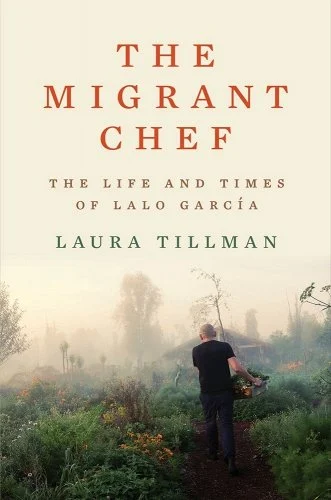Reading Lists
7 Books On the Political Implications of Your Next Meal
You will never look at food the same way again

When I started reporting The Migrant Chef: The Life and Times of Lalo Garcia, back in 2016, I had a strong hunch that by chronicling the back of house at a fine dining restaurant, I might be able to observe, in microcosm, the broader social, political and cultural dynamics in Mexico today. A restaurant, as I learned over more than five years of immersive reporting, is indeed a stage, where narratives about class and culture are performed at every service. I ultimately focused my book on the propulsive story of Chef Eduardo “Lalo” García Gúzman, whose odyssey from migrant farmworker in the US fields to incarceration and deportation, to becoming one of the most celebrated chefs on the planet, maps the politics of the food and immigration systems that unite and divide the U.S. and Mexico. But my goal was never to approach writing about Lalo or his restaurant through a didactic formula, be it a policy or a dish on the menu. I wanted to get readers to care about following Lalo’s journey by virtue of his specific magnetism and insight—a chef who is navigating an elite stratosphere, but whose loyalty is to the essential worker—the migrant in the fields and the dishwasher behind the sink.
In the course of my research, I spent time in the kitchen with Lalo and his staff. I traveled from Mexico to Georgia to Dubai. I ate a lot of amazing food. And I also had the opportunity to read astounding books in a genre I hadn’t explored much before: food politics. Food, in its universality, offers a lens on virtually all of the critical issues that face humanity, from climate change to labor inequality to racism, but food also offers endless opportunities to seek out connection, investigate culture and the artistic process, and to write aesthetically lush prose that elicits sensual experiences. After reading these books, I found myself looking at my dinner plate differently, with new context, new frustrations—and hope. The books on this list offer a spectrum of approaches to writing on food, society, and identity. Whether they use the tools of journalism, academic research, or memoir, they’re all based in a deep appreciation of the role that food plays in shaping community.
Eating NAFTA: Trade, Food Policies, and the Destruction of Mexico by Alyshia Gálvez
More than any other book I encountered while reporting The Migrant Chef, I came back to Eating NAFTA over and over again, both for reference and the pleasure of reading Gálvez’s writing. This expansive, anthropological work analyzes the disastrous impact of the passage of the North American Free Trade Agreement on Mexico’s food, including the physical health and cultural heritage of Mexicans. It’s rare to encounter an academic text this engaging and creative, which uses the lens of food to go deep into both history, economics and contemporary life in Mexico. Gálvez is critical but, as she says in her introduction, always writes from a place of deep love for Mexico and its gastronomic genius.
The American Way of Eating: Undercover at Walmart, Applebee’s, Farm Fields, and the American Dinner Table by Tracie McMillan
In this work of immersion journalism, reporter Tracie McMillan embeds in a range of environments essential to understanding the inner workings of the American food system—toiling alongside migrants picking garlic in California’s Central Valley, working at a Walmart in Michigan and an Applebee’s in New York. The American Way of Eating came out in 2012, and the essential point that McMillan makes remains true a decade later: there might be ever-growing consciousness, even preciousness, about the pedigrees of the products that we put in our bodies, but there’s still virtually no concern for the conditions of the workers who harvest, prepare and serve that food.
Koshersoul: The Faith and Food Journey of an African American Jew by Michael W. Twitty
In part two of his trilogy on food and identity, Michael Twitty offers an expansive, empathic vision of identity and shared history, as an African American Jew—a member of a varied community. Twitty is a gorgeous writer, and no matter how dense the research that went into the writing of these pages, his voice always comes through: clear, playful, assured and curious. As a fellow Jew, I marveled at Twitty’s ability to capture the qualities of Jewish food I’d always sensed but never full articulated, like this passage on cooking as time travel: “this penchant for Jewish food as a time machine makes the experience of Jewish food feel as though you’ve entered historical moments and captured them with your senses—even if you really haven’t.”
Taco USA: How Mexican Food Conquered America by Gustavo Arellano
Journalist and Los Angeles Times columnist Gustavo Arellano is one of our greatest culture writers, and in Taco USA his signature verve and unquenchable curiosity come together to reveal the fascinating history of Mexican food in the United States. Each chapter answers a question that I very much wanted Arellano to answer, from “How did salsa become America’s top-selling condiment?” to “Is the tortilla God’s favored method of communication?” Taco USA does more than map the history of food, it transforms our ability to comprehend the history of the United States: I’d visited San Antonio many times and seen the Alamo, but as Arellano describes the chili con carne vendors in surrounding plazas, and how city officials “eventually legislated them out of existence,” he summons a far more dynamic, living history. Arellano writes that he hopes readers come away hungry, not just to tuck into their next taco, but to learn more. He most definitely succeeds.
Animal, Vegetable, Junk: A History of Food from Sustainable to Suicidal by Mark Bittman
This deeply ambitious book endeavors to map the whole history of humanity’s relationship with food, from the hunter-gatherer, to early attempts at agriculture, all the way to today’s highly-processed, barely-recognizable “junk,”—and what might come next. This all-encompassing approach is unsurprising coming from Bittman, who is best known for his equally ambitious guide, How to Cook Everything, and his columns for The New York Times. Recently, a friend told me that, more than math or reading, she wants her young sons to learn how to grow food, essential for survival in a rapidly changing world. Animal, Vegetable, Junk would make for an essential companion to that effort, giving the next generation firm ground to stand upon as they seek to understand the roots of our dysfunction, as well as how it might be undone. Bittman never shies away from the dark side of this equation (suicidal is in the title, after all), but at heart he’s an optimist, who knows that to empower readers to correct the wrongs of the past, clear-eyed truth-telling is in order.
Taste Makers: Seven Immigrant Women Who Revolutionized Food in America by Mayukh Sen
Mayukh Sen, the son of Bengali immigrants, took on this ambitious project to map the history of American cuisine through the stories of immigrant women. Food media likes celebrity, and part of Sen’s challenge was to seek out figures who had been marginalized, but who nonetheless profoundly influenced American food culture. Sen sets about this task with commitment and rigor, using a wide range of source material to disentangle the media’s representations of these women during their time from their true stories, trails blazed through a culture thick with misogyny and racism.
Jubilee: Recipes from Two Centuries of African American Cooking by Toni Tipton-Martin
Food Journalist Toni Tipton-Martin’s Jubilee is a masterwork; as an avid home cook and cookbook reader, it stands out on my shelf: beautiful in form, deeply researched, a critical contribution to the history of American food, and astounding in the cuisine it allows you to produce with Tipton-Martin’s guidance. Jubilee builds on Tipton-Martin’s work in The Jemima Code: Two Centuries of African American Cookbooks, which brings together 150 black cookbooks, showing an incredible range of both techniques and experience. In Jubilee, she makes those recipes visceral, “presenting and translating them for today’s kitchens,” while expanding on their history, meaning and legacy in short essays.









